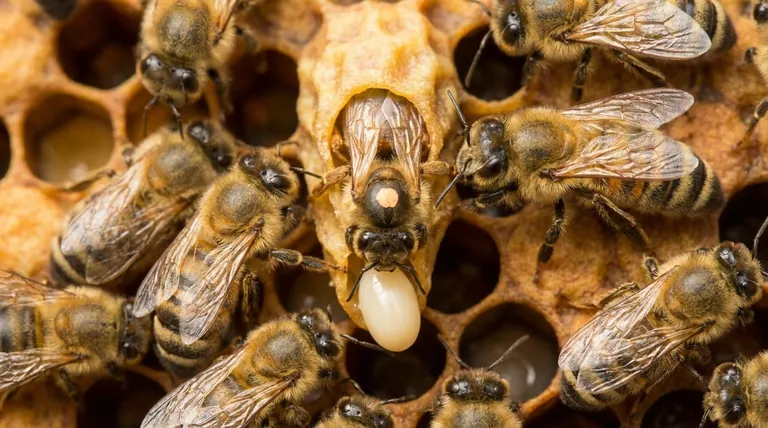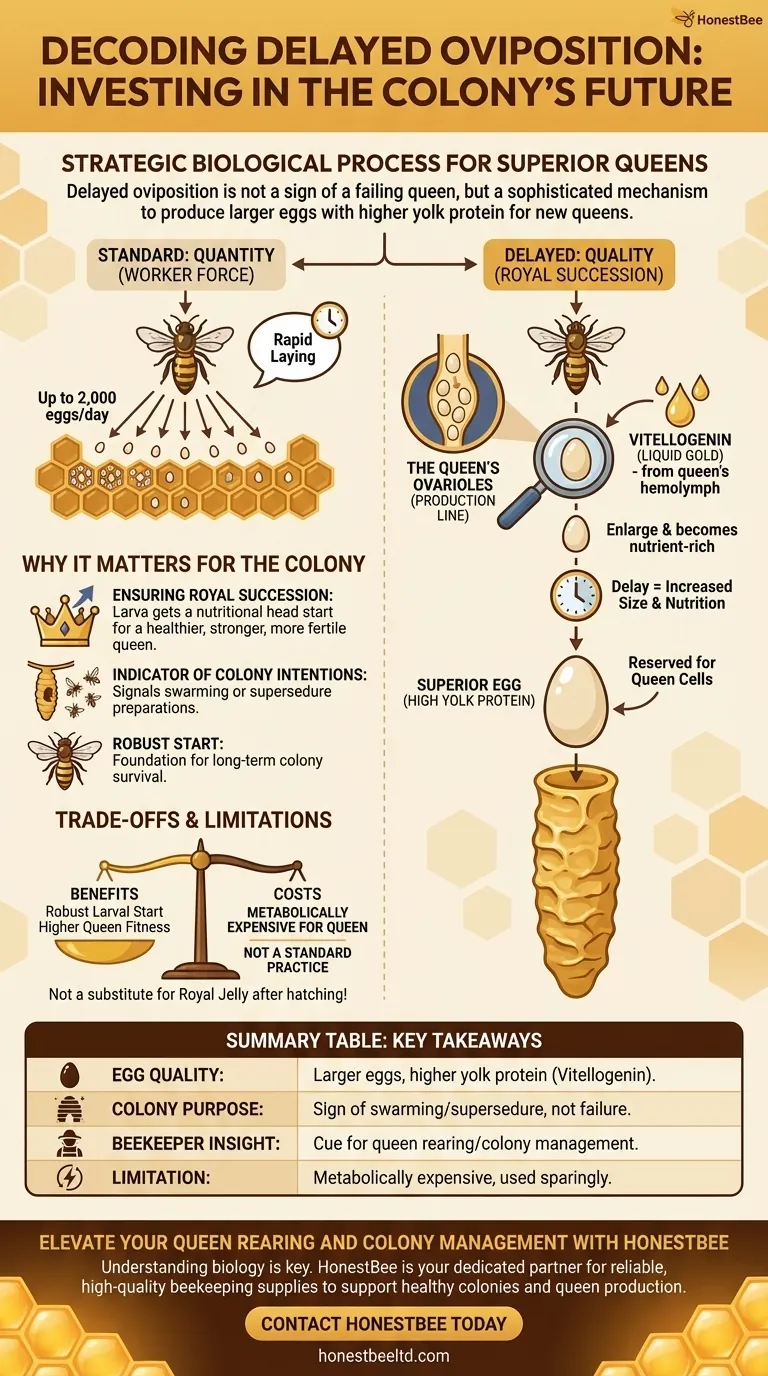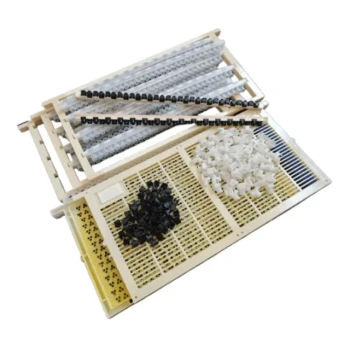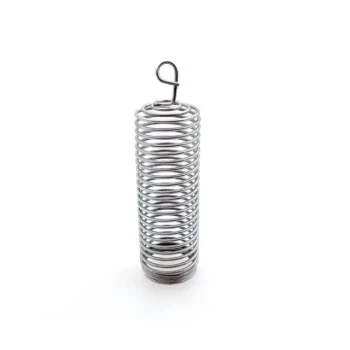Delayed oviposition in queen bees is a strategic biological process that results in the production of larger eggs with a higher concentration of yolk protein. While most eggs are laid rapidly to build the worker force, this intentional delay allows the queen to invest more nutritional resources into specific eggs destined for a critical purpose, such as becoming a new queen.
This is not a sign of a failing queen but rather a sophisticated mechanism for quality control. It allows the colony to ensure its most important members—new queens—receive the best possible start in life, directly from the egg itself.

The Biological Mechanism: How Delay Creates a Superior Egg
The process of enhancing an egg by delaying its laying is a fascinating example of biological resource management. It hinges on how eggs are formed and nourished within the queen's body.
The Role of Vitellogenin
Vitellogenin is the primary yolk protein in insects, serving as the crucial nutritional foundation for the developing embryo. Think of it as the "liquid gold" that provides all the essential proteins and fats the larva needs before it hatches.
The Queen's Ovarioles as a Production Line
A queen bee's reproductive system functions like a continuous assembly line. Eggs develop in tubes called ovarioles, and as they mature, they are supplied with vitellogenin from the queen's blood (hemolymph).
When an egg is held in the queen's lateral oviducts just before being laid, it can continue to absorb this vital protein. A delay of even a few hours allows for a significant increase in the egg's final size and nutritional content.
From Quantity to Quality
For the vast majority of her life, a queen's priority is quantity, laying up to 2,000 worker eggs per day. However, when the colony prepares to swarm or replace her (supersedure), the priority shifts to quality for the few eggs that will become new queens.
Why This Matters for the Colony
This mechanism is not random; it is directly linked to the most critical events in a colony's life cycle: the creation of new queens.
Ensuring Royal Succession
When worker bees decide a new queen is needed, they build special, vertically-oriented wax cells called queen cells. The existing queen will then lay a fertilized egg into this cell. The delay in laying this specific egg ensures it is of the highest possible quality.
A Head Start in Life
A larva that hatches from a larger, yolk-rich egg has an immediate nutritional advantage. This robust start contributes to the development of a healthier, stronger, and potentially more fertile adult queen, which is paramount for the colony's long-term survival.
An Indicator of Colony Intentions
For a beekeeper, observing the presence of polished queen cells is a key sign that the colony is preparing to swarm or supersede its queen. This behavior directly triggers the queen's delayed oviposition into those cells.
Understanding the Trade-offs and Limitations
While beneficial, this process has inherent costs and is not the default method for egg-laying. It's a specialized tool for a specific, high-stakes job.
Not a Standard Practice
Delayed oviposition is reserved almost exclusively for eggs laid in queen cells. The rapid laying of thousands of worker eggs is essential for maintaining the massive workforce required for foraging, defense, and brood care.
The Energy Cost to the Queen
Producing larger, protein-rich eggs is metabolically expensive. It demands more of the queen's energy and nutritional resources, which is why it is used sparingly and only for the most critical reproductive task—creating her successor.
Not a Substitute for Post-Hatch Nutrition
A superior egg provides a strong foundation, but it does not guarantee a superior queen. The larva's development is overwhelmingly dependent on the constant, lavish feeding of royal jelly by nurse bees after it hatches. The high-quality egg is the head start, but the royal jelly diet completes the race.
What This Means for Your Goals
Understanding this principle has practical implications for beekeepers and researchers who interact with and study honey bee colonies.
- If your primary focus is queen rearing: Actively providing a healthy, well-fed queen with properly prepared queen cells allows you to leverage this natural quality-enhancing mechanism for producing robust new queens.
- If your primary focus is colony management: Recognizing that the conditions prompting delayed oviposition are tied to swarming or supersedure allows you to interpret colony behavior and intervene proactively if needed.
- If your primary focus is bee biology: This serves as a clear example of strategic parental investment, where resources are allocated precisely to maximize the fitness of high-value offspring.
Ultimately, delayed oviposition is a sophisticated evolutionary strategy that allows a honey bee colony to invest heavily and intelligently in its own future leadership.
Summary Table:
| Implication | Key Takeaway |
|---|---|
| Egg Quality | Results in larger eggs with higher yolk protein (vitellogenin) for a nutritional head start. |
| Colony Purpose | A sign of swarming or supersedure, not a failing queen. |
| Beekeeper Insight | Indicates colony is preparing to raise new queens; a cue for management decisions. |
| Limitation | Metabolically expensive for the queen; used only for critical queen-rearing events. |
Elevate Your Queen Rearing and Colony Management
Understanding the nuances of queen bee biology is key to successful beekeeping. Whether you manage a commercial apiary or distribute beekeeping equipment, having access to high-quality supplies is fundamental.
HONESTBEE is your dedicated partner, supplying beekeepers and distributors with the reliable equipment needed to support healthy colonies and effective queen production. From durable hive components to essential tools, we provide the foundation for your success.
Ready to strengthen your operation with top-tier beekeeping supplies?
Contact HONESTBEE today to discuss your wholesale needs and discover how our products can contribute to your thriving apiaries.
Visual Guide

Related Products
- Jenter Queen Rearing Kit Complete Set for Bee Breeding
- No Grafting Queen Rearing Kit: System for Royal Jelly Production and Queen Rearing
- Nicot Queen Rearing Kit for Beekeeping and Grafting in Nicot System
- Durable Galvanized Steel Spring Queen Bee Cage
- Brown Nicot Queen Cell Cups for Breeding Queen Bees Beekeeping
People Also Ask
- What is the importance of using high-precision incubators for the emergence of drones? Boost Your Breeding Success
- Why are specialized queen rearing equipment and laboratory consumables necessary for genetic honeybee breeding?
- How can a cell builder colony be managed for reuse in queen rearing? Master the 10-Day Maintenance Protocol
- What is the significance of Hill function production parameters? Optimize Queen Rearing & Brood Management Success
- What is the key factor in determining whether a larva becomes a queen? The Power of Royal Jelly
- What technical advantages do professional Queen Rearing Kits provide? Maximize Apiary Yields and Genetic Quality
- What should be avoided during the mating period of virgin queens? Ensure a Successful Mating Flight
- What is the function of high-precision pins in the pin-killed brood method? Enhance Your Bee Breeding Accuracy



















